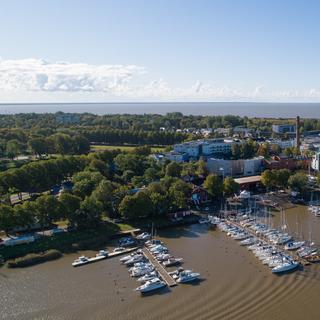Šiauliai weather and climate in 2025
Day
22 °C
Night
12 °C
Sea
18 °C
Precipitation
72 mm
in month
Rainy days
12 days
in month
Daylight
15 hours
average
Sunshine
8 hours
average
Humidity
78 %
Weather charts for Šiauliai
Find more destinations like this
Closest destinations for Šiauliai
Closest cities for Šiauliai
Weather overview for Šiauliai
Weather overview
Šiauliai, Lithuania, a city marked by a continental climate, offers a vivid tapestry of weather patterns throughout the year. With temperatures ranging from the crisp lows of -6 °C (21 °F) in the heart of winter to the pleasant highs of 23 °C (73 °F) in the balmiest month of July, the inhabitants and visitors experience a significant seasonal shift. Precipitation varies, with the summer months experiencing the highest rainfall peaking at 78 mm (3.07 in) in July. The daylight hours extend generously during summer with as many as 9 hours of sun, while the short winter days see just 1 hour. Notably, Šiauliai doesn't have a significant variation of wet days throughout the year, but the coldest months certainly see more solid precipitation.
January weather
In the height of winter, January sees the chilling night temperatures dropping to -6 °C (22 °F) on average, with daytime temperatures hardly warmer at -1 °C (30 °F). The month also offers a sparse 1 hour of sunshine, making the layers of clothing a necessity for braving the Lithuanian cold.
February weather
February, still gripped by winter, offers a slight uptick in sunshine to 2 hours, yet the temperatures remain unforgiving with nightly averages of -6 °C (21 °F) and day temperatures hovering around -1 °C (31 °F).
March weather
March heralds the tentative arrival of spring with an average daily high of 4 °C (38 °F), but the nights are still cold with temperatures around -3 °C (26 °F). The additional sunshine at 4 hours aids in the thawing landscape.
April weather
April's bloom is accompanied by significant warming, with days reaching up to 11 °C (52 °F) on average. The chilly 2 °C (35 °F) nights begin to recede, and the city gets bathed in 6 hours of sunshine.
May weather
May in Şiauliai showcases a marked increase in warmth with 18 °C (64 °F) during the day, paring back night's chill to an average of 7 °C (44 °F). The frequency of wet days at 9 days suggests a moderate chance of rain.
June weather
June brings the start of summer, with the thermometer displaying an average high of 20 °C (69 °F), and a much-improved 10 °C (50 °F) at night. Flowery landscapes are complemented by an average of 9 hours of sunlight.
July weather
Peak summer in July sees the highest temperatures, averaging at 23 °C (73 °F) during the day, and the nights hold a comfortable 13 °C (55 °F). Rainfall reaches its maximum at 78 mm (3.07 in), and sunny days remain the norm at 8 hours.
August weather
August slightly cools off with a daytime average of 22 °C (71 °F) but remains summery. The nights are similar to July at 12 °C (54 °F). Notably, 72 mm (2.83 in) of precipitation and 8 hours of sun keep the balance between warmth and rain.
September weather
The gentle decline of summer is felt in September, with average highs tapering to 16 °C (61 °F) and night temperatures cooling to 8 °C (46 °F), while sunshine hours dip to 5 hours.
October weather
October ushers in the crisp air of autumn, with day temperatures of 10 °C (51 °F). The chill becomes apparent at night, with an average of 4 °C (39 °F). The changing leaves are matched with 3 hours of daylight.
November weather
November sees a notable decrease in temperatures, with daytime averages falling to 4 °C (39 °F) and nights dipping to bracing 0 °C (31 °F). The days shorten to a mere 1 hour of daily sunshine.
December weather
As winter takes hold in December, temperatures plunge to average highs of just 0 °C (32 °F) and the nights are frigid at -4 °C (24 °F). The minimal sun at 1 hour accentuates the seasonal darkness.
FAQs
How many layers should I wear in Šiauliai during January?
In Şiauliai's January cold, with average highs barely at -1 °C (30 °F), wearing several layers is key for maintaining comfort – think thermal underlayers, insulating mid-layers, and windproof outerwear.
Is February much warmer than January in Šiauliai?
February in Şiauliai might give a feel of being slightly warmer, with days averaging a tad above January's -1 °C (30 °F), but with an average night low of -6 °C (21 °F), it's still firmly within the winter's clasp.
Is the weather in Šiauliai in March suitable for outdoor activities?
Outdoor enthusiasts can start to enjoy milder March weather in Şiauliai, with temperatures climbing to 4 °C (38 °F) and longer sunlit hours at 4 hours, though chillier nights necessitate warm attire.
Can I leave my winter coat at home when visiting Šiauliai in April?
With April's daytime highs reaching a pleasant 11 °C (52 °F), a winter coat might be excessive for Şiauliai, but keep a lighter jacket handy for those cooler 2 °C (35 °F) nights.
Is May a good time to experience warm weather in Šiauliai?
May welcomes the warmth in Şiauliai, inviting with day temperatures reaching 18 °C (64 °F), making it an enjoyable time for outdoor adventures.
How long are the days in Šiauliai during the month of June?
June enjoys the longest days in Şiauliai, with approximately 9 hours of sunshine allowing for extended enjoyment of the outdoors and late sunsets.
What sort of temperatures will I encounter in Šiauliai in July?
Šiauliai's July offers warmth and abundant daylight with average highs of 23 °C (73 °F), presenting the perfect time for outdoor dining and lakeside relaxation.
Is August still a good time for picnics in Šiauliai parks?
With warm average temperatures of 22 °C (71 °F), August in Şiauliai continues to be perfect for picnicking amidst the greenery and enjoying the outdoor life.
What kind of weather should I prepare for in Šiauliai in September?
Prepare for a mix of late summer and early autumn in Şiauliai this September, with still-pleasant 16 °C (61 °F) days gradually giving way to cooler 8 °C (46 °F) evenings.
How should I dress for October weather in Šiauliai?
October in Şiauliai asks for layers; cozy sweaters and jackets suit the 10 °C (51 °F) days and chillier 4 °C (39 °F) nights—plus, an umbrella for occasional showers.
Is November in Šiauliai very cold?
November heralds the approach of winter in Şiauliai, with temperatures reaching 4 °C (39 °F) during the day and frosty 0 °C (31 °F) nights, necessitating warm clothing.
How cold does it get in Šiauliai in December?
December is quite cold in Şiauliai, with average high temperatures barely above freezing at 0 °C (32 °F) and nights that dive down to -4 °C (24 °F), requiring ample winter gear to stay warm.
We make the most from 40 years of historical weather data to predict the best weather conditions.
Deciding on where to go for a holiday is hard sometimes. Get inspired by the most popular destinations.
We aggregate data from combining multiple weather sources to ensure accuracy of the highest order.







